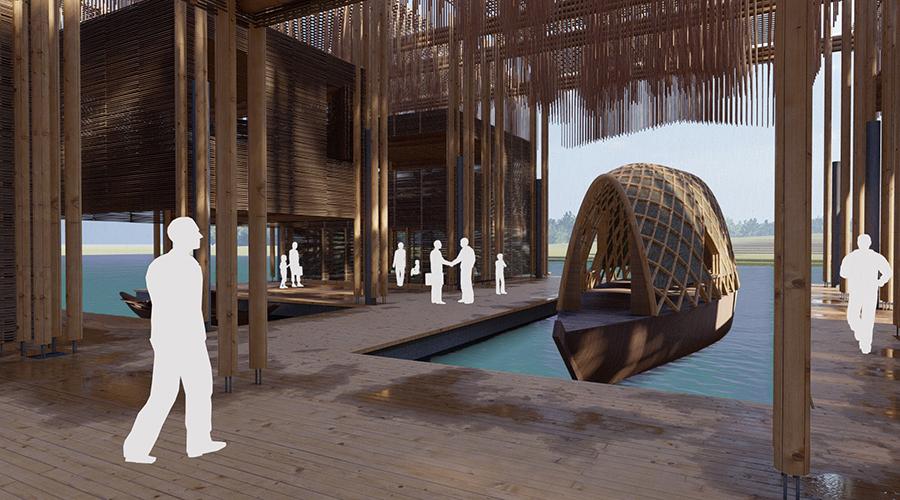- About
- Admissions
- Study at AUS
- Prospective Students
- Bachelor's Degrees
- Master's Degrees
- Doctoral Degrees
- Admission Publications
- International Students
- Contact Admissions
- Grants and Scholarships
- Sponsorship Liaison Services
- Testing Center
- New Student Guide
- File Completion
- New Student Orientation
- Payment Guide
- Executive Education
- Students with Disabilities
- Academics
- Life at AUS
- Research
- Contact Us
- Apply Now
- .

AUS architecture students propose winning sustainable design for school in Bangladesh
Architecture students from American University of Sharjah (AUS) were awarded first, second and third place for their original designs for a sustainable floating school in a flood-impacted area of Bangladesh, as part of a semester-long Climate Change Challenge initiated by Fatima bint Hazza Foundation.
The competition was integrated into the Fall 2020 curriculum for students of architecture at AUS, as well as students from UAE University in Al Ain and Manipal Academy of Higher Education in Dubai. Over 15 weeks, the students were required to brainstorm, research and employ design thinking towards an efficient, resourceful and easy-to-implement floating school that will function both as a boat as well as a classroom for students in flood-impacted areas of Bangladesh, while proposing solutions to elevate the living conditions of vulnerable communities.
Conceived by Mourad Ben Ayed, advisor to SMEs and non-profit organizations on topics of sustainability and climate change, the inaugural challenge aimed to engage UAE youth in proposing sustainable solutions for developing communities impacted by floods and rising water levels.
Ben Ayed said, “I hope that, by launching this initiative, UAE students continue to engage with climate action beyond the classroom and project. This initiative has allowed them to understand the impact of climate change on vulnerable communities and gave them the opportunity to take action by designing with a purpose while being creative and pragmatic.”
Maysoon Barber, Executive Director of the Fatima bint Hazza Foundation, said the Climate Change Challenge was an opportunity to reward the creativity of youth and create a bridge between the UAE to Bangladesh using talent and human capital as a medium.
First-prize winners Maitha AlHammadi and Afra AlFalasi said the competition pushed them to think beyond aesthetics in finding sustainable solutions to environmental factors such as heat, rain, wind and flood.
“Given the social, climatic, and environmental conditions of the project’s site in Bhangura, Bangladesh, we had to consider and overcome a number of challenges—the most critical of these being its vulnerabe position along the flood-prone banks of the Gumani River. The solution we opted for was a floating foundation that would adapt to the constant radical changes in water level, which in itself introduced questions of buoyancy, stability, materiality and sustainability,” said AlHammadi and AlFalasi.
Their winning design, “Floating Community, Bangladesh”, also addressed the need to provide quality childhood education on a floating foundation while taking into account questions of sustainability and energy in its off-the-grid location. Their innovative design incorporates the use of locally sourced bamboo as the primary material and is powered by solar energy.
“The Climate Change Challenge has helped us understand that sustainable design requires far more thoughtful consideration. We saw this as an opportunity to design something that will ensure a better future for humanity instead of following the footsteps of designers that have not benefited the environment or local communities,” they said.
AUS students Aju Irine and Ali Niha were awarded second place, and Nada Abdulmaguid and Sara Bokr took third place for their own unique designs of the floating school concept. The students thanked Assistant Professor George Newlands for his guidance throughout the design process.
“The competition and its objectives were an excellent opportunity to take part in something positive, in a very difficult year. The entire studio achieved some exemplary results tackling complex issues of global warming and resource availability in a remote area, and realizing the design potential and possibilities in addressing those problems,” said Newlands.
While there is no confirmed time frame, the winning design is expected to be constructed in Bangladesh, engaging the local community and using local, sustainable resources.
The next Climate Change Challenge is expected to engage design students on a sustainable solution for a community in Africa.
For more information about the award-winning students, alumni and faculty from the College of Architecture, Art and Design at American University of Sharjah, visit www.aus.edu/caad.

